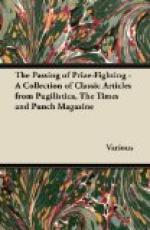* * * * *
We doubt whether Mr. BOOTH TARKINGTON’S many admirers on this side of the Atlantic will read The Magnificent Ambersons (HODDER AND STOUGHTON) with any great sense of satisfaction. George Minafer is a spoilt and egotistical cad, and as we pursue his unpleasant personality from infancy onward our impatience with the adoring relatives who allow the impossible little bounder to turn their lives to tragedy becomes more and more pronounced. In England his “come uppance” would have commenced at an early age and in the time-honoured place thereunto provided. But in the case of young American nabobs these corrective agencies are too often wanting, and though it is hard to believe that a sophisticated uncle, a soldier grandfather and various other relatives would have allowed a conceited and overbearing young boor to wreck his mother’s life by separating her from a former sweetheart, it cannot be said that such cases have not existed or that the picture is altogether overdrawn. But we do not like George Minafer, and his final reconciliation with his own sweetheart and her father—the man whom ho has prevented his mother from marrying—leaves us cold. But if the characters are unpleasing the craftsmanship of The Magnificent Ambersons is of Mr. BOOTH TARKINGTON’S best, and his description “of the decline and fall of a locally supreme dynasty of plutocrats before the hosts of the Goths and Huns of spawning industrialism is almost a contribution to American social history.
* * * * *
[Illustration: Disturbed Burglar. “’SORL RIGHT, CONSTABLE. I’M ONLY ‘AVIN’ A GLOAT OVER ME WHIST-DRIVE PRIZES.”]
* * * * *
Of the two tales in Wild Youth and Another (HUTCHINSON) I prefer the other. In “Wild Youth” Sir GILBERT PARKER gives us the unedifying picture of a horrible old man married to a young and pretty girl. Jealous, tyrannical and vicious, this creature—referred to as a behemoth—is in all conscience unsavoury enough; but no one can read his story without feeling that he never had a dog’s chance; and although the tale is in many respects well-told, I feel that it would have been vastly improved if some redeeming qualities had been vouchsafed to the villain of the piece. “Jordan is a Hard Road” is a more engaging piece of work. Here we have a man who has walked through most of the commandments—with especial attention to the eighth—trying to mend his ways. And he makes rather a sound job of it until something quite unforeseen happens; and then the old Adam (if this is quite fair to Adam) asserts himself. From a publisher’s “literary note” enclosed in this book you will learn that Sir GILBERT’S imagination is “as boundless as the tracts of the Prairie which he loves and knows how to make his readers love.” This is perhaps rather a large order, but I will content myself by saying that for the scenes of these stories Sir GILBERT has chosen ground that is familiar to him, and that knowledge is sometimes even more useful than imagination.




